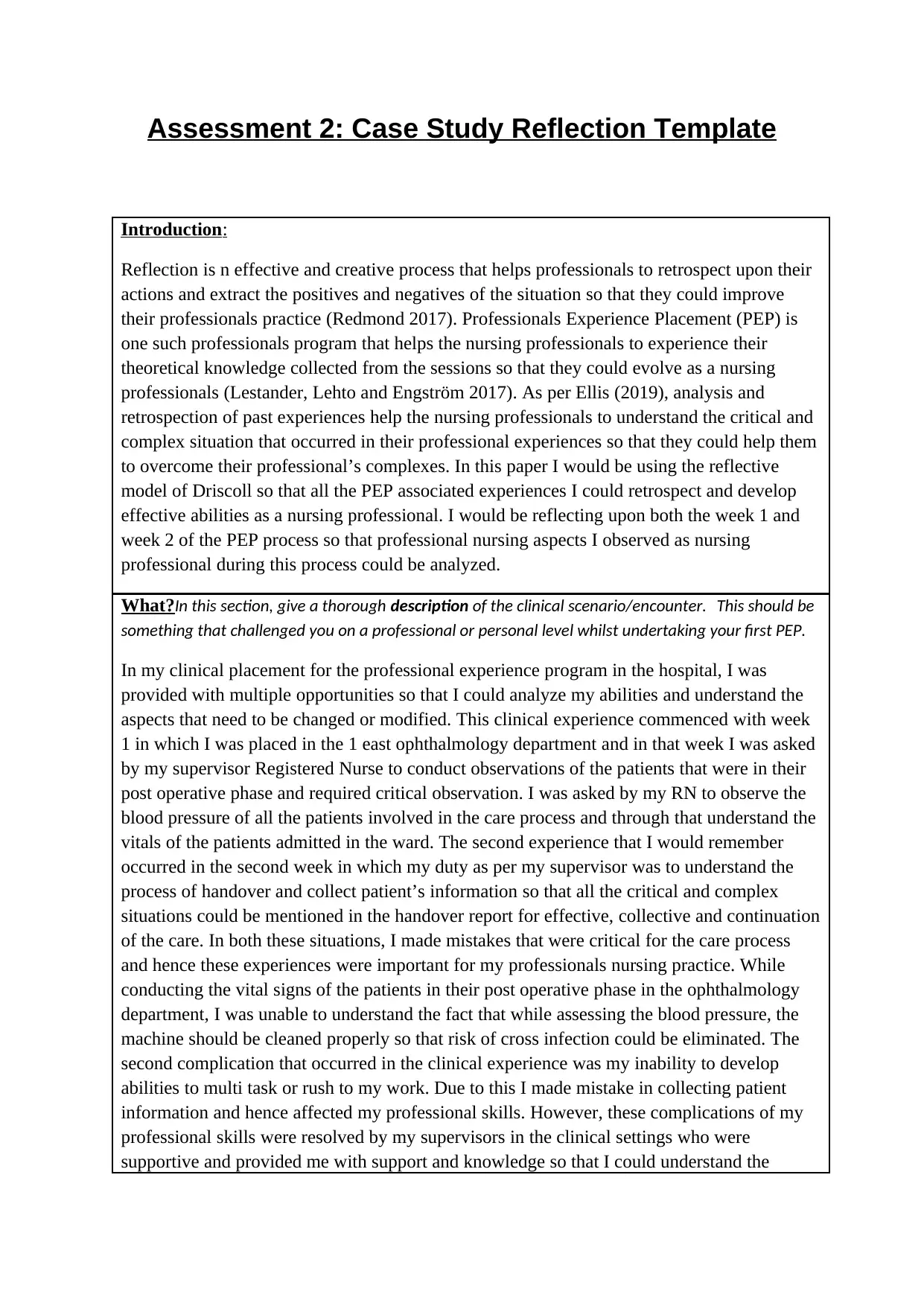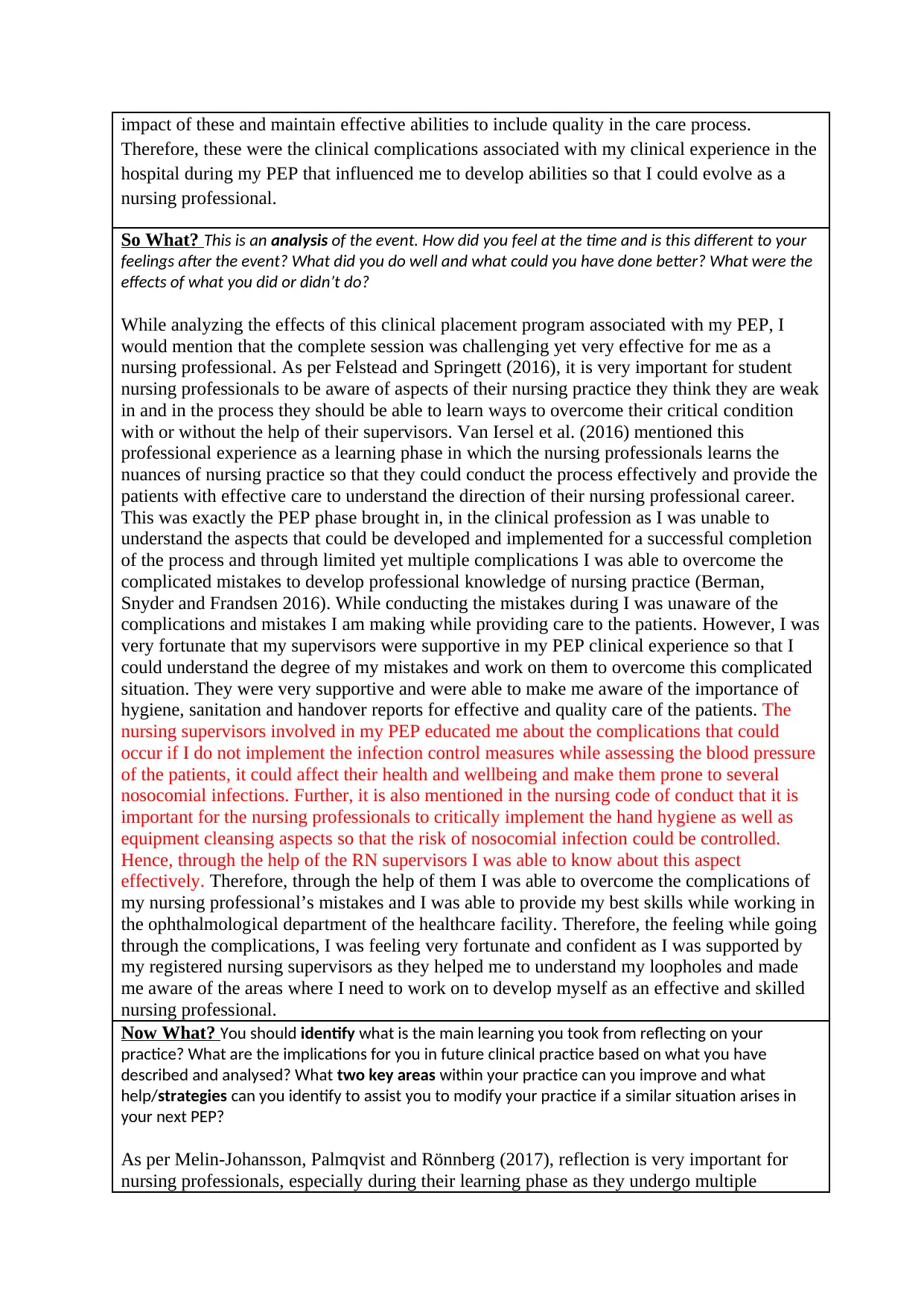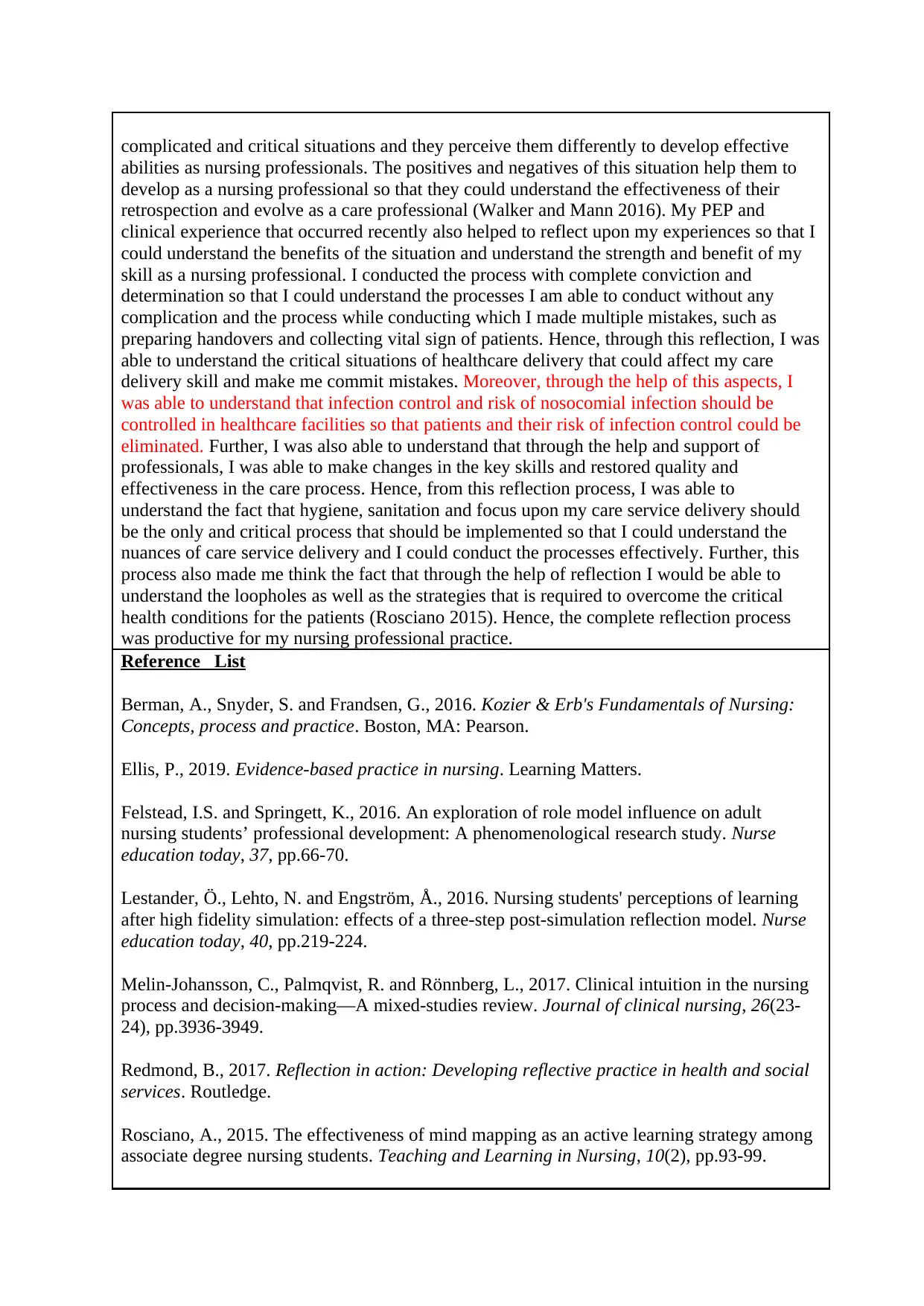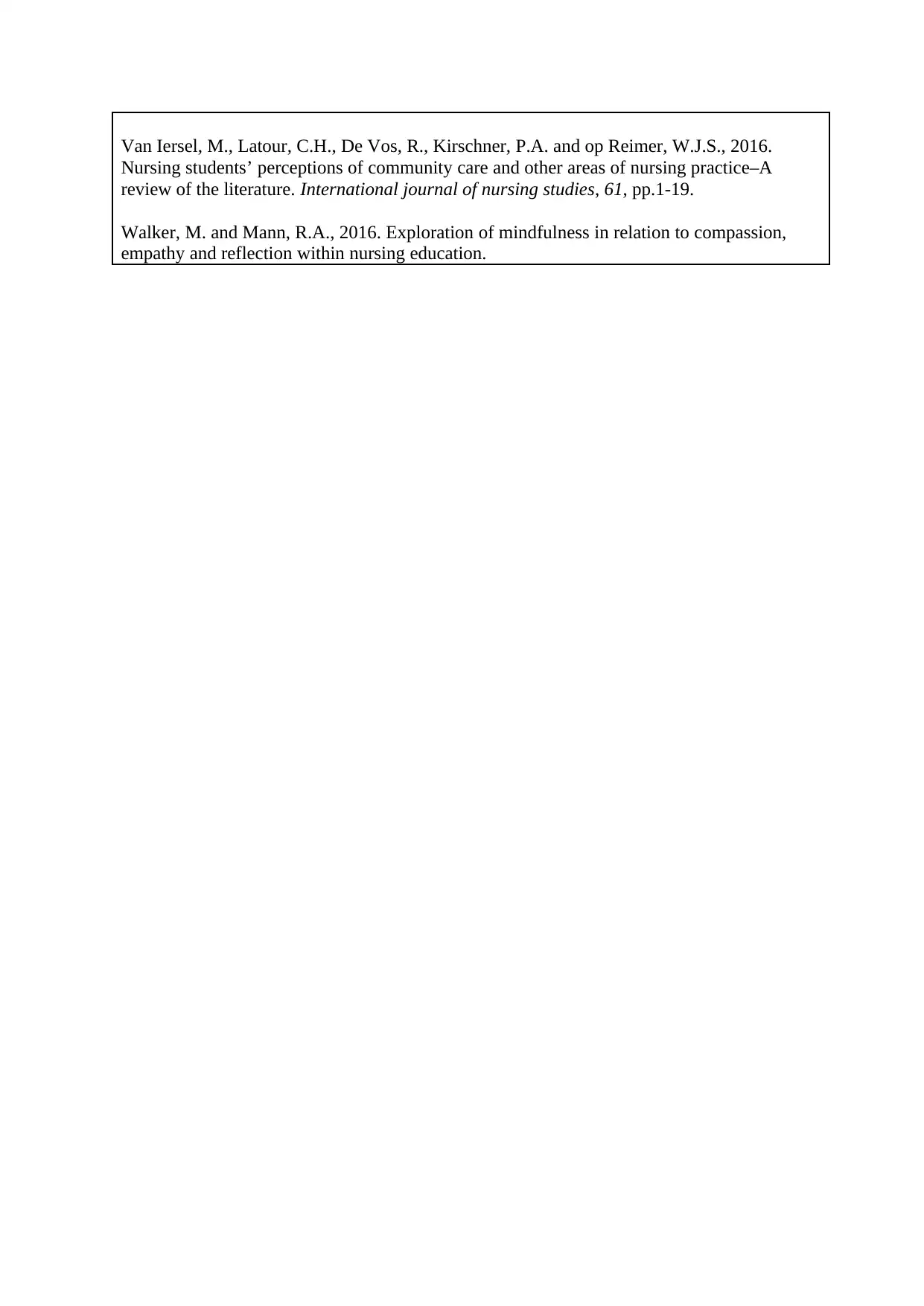Reflective Case Study: Nursing PEP Experience and Learning Outcomes
VerifiedAdded on 2022/10/17
|4
|1931
|41
Case Study
AI Summary
This case study reflects on a nursing student's Professional Experience Placement (PEP) in a hospital setting, utilizing Driscoll's reflective model. The student recounts experiences in the ophthalmology department, detailing challenges related to patient observation, vital sign assessment, and handover processes. The reflection analyzes the student's feelings, actions, and the impact of their performance, highlighting the importance of hygiene, infection control, and effective communication. The student identifies key learnings, including the need for improved multitasking, attention to detail, and adherence to infection control protocols. The paper concludes with strategies for improvement, such as seeking support from supervisors and focusing on hygiene and sanitation, aiming to enhance clinical practice and professional development within the field of nursing.

Assessment 2: Case Study Reflection Template
Introduction:
Reflection is n effective and creative process that helps professionals to retrospect upon their
actions and extract the positives and negatives of the situation so that they could improve
their professionals practice (Redmond 2017). Professionals Experience Placement (PEP) is
one such professionals program that helps the nursing professionals to experience their
theoretical knowledge collected from the sessions so that they could evolve as a nursing
professionals (Lestander, Lehto and Engström 2017). As per Ellis (2019), analysis and
retrospection of past experiences help the nursing professionals to understand the critical and
complex situation that occurred in their professional experiences so that they could help them
to overcome their professional’s complexes. In this paper I would be using the reflective
model of Driscoll so that all the PEP associated experiences I could retrospect and develop
effective abilities as a nursing professional. I would be reflecting upon both the week 1 and
week 2 of the PEP process so that professional nursing aspects I observed as nursing
professional during this process could be analyzed.
What?In this section, give a thorough description of the clinical scenario/encounter. This should be
something that challenged you on a professional or personal level whilst undertaking your first PEP.
In my clinical placement for the professional experience program in the hospital, I was
provided with multiple opportunities so that I could analyze my abilities and understand the
aspects that need to be changed or modified. This clinical experience commenced with week
1 in which I was placed in the 1 east ophthalmology department and in that week I was asked
by my supervisor Registered Nurse to conduct observations of the patients that were in their
post operative phase and required critical observation. I was asked by my RN to observe the
blood pressure of all the patients involved in the care process and through that understand the
vitals of the patients admitted in the ward. The second experience that I would remember
occurred in the second week in which my duty as per my supervisor was to understand the
process of handover and collect patient’s information so that all the critical and complex
situations could be mentioned in the handover report for effective, collective and continuation
of the care. In both these situations, I made mistakes that were critical for the care process
and hence these experiences were important for my professionals nursing practice. While
conducting the vital signs of the patients in their post operative phase in the ophthalmology
department, I was unable to understand the fact that while assessing the blood pressure, the
machine should be cleaned properly so that risk of cross infection could be eliminated. The
second complication that occurred in the clinical experience was my inability to develop
abilities to multi task or rush to my work. Due to this I made mistake in collecting patient
information and hence affected my professional skills. However, these complications of my
professional skills were resolved by my supervisors in the clinical settings who were
supportive and provided me with support and knowledge so that I could understand the
Introduction:
Reflection is n effective and creative process that helps professionals to retrospect upon their
actions and extract the positives and negatives of the situation so that they could improve
their professionals practice (Redmond 2017). Professionals Experience Placement (PEP) is
one such professionals program that helps the nursing professionals to experience their
theoretical knowledge collected from the sessions so that they could evolve as a nursing
professionals (Lestander, Lehto and Engström 2017). As per Ellis (2019), analysis and
retrospection of past experiences help the nursing professionals to understand the critical and
complex situation that occurred in their professional experiences so that they could help them
to overcome their professional’s complexes. In this paper I would be using the reflective
model of Driscoll so that all the PEP associated experiences I could retrospect and develop
effective abilities as a nursing professional. I would be reflecting upon both the week 1 and
week 2 of the PEP process so that professional nursing aspects I observed as nursing
professional during this process could be analyzed.
What?In this section, give a thorough description of the clinical scenario/encounter. This should be
something that challenged you on a professional or personal level whilst undertaking your first PEP.
In my clinical placement for the professional experience program in the hospital, I was
provided with multiple opportunities so that I could analyze my abilities and understand the
aspects that need to be changed or modified. This clinical experience commenced with week
1 in which I was placed in the 1 east ophthalmology department and in that week I was asked
by my supervisor Registered Nurse to conduct observations of the patients that were in their
post operative phase and required critical observation. I was asked by my RN to observe the
blood pressure of all the patients involved in the care process and through that understand the
vitals of the patients admitted in the ward. The second experience that I would remember
occurred in the second week in which my duty as per my supervisor was to understand the
process of handover and collect patient’s information so that all the critical and complex
situations could be mentioned in the handover report for effective, collective and continuation
of the care. In both these situations, I made mistakes that were critical for the care process
and hence these experiences were important for my professionals nursing practice. While
conducting the vital signs of the patients in their post operative phase in the ophthalmology
department, I was unable to understand the fact that while assessing the blood pressure, the
machine should be cleaned properly so that risk of cross infection could be eliminated. The
second complication that occurred in the clinical experience was my inability to develop
abilities to multi task or rush to my work. Due to this I made mistake in collecting patient
information and hence affected my professional skills. However, these complications of my
professional skills were resolved by my supervisors in the clinical settings who were
supportive and provided me with support and knowledge so that I could understand the
Paraphrase This Document
Need a fresh take? Get an instant paraphrase of this document with our AI Paraphraser

impact of these and maintain effective abilities to include quality in the care process.
Therefore, these were the clinical complications associated with my clinical experience in the
hospital during my PEP that influenced me to develop abilities so that I could evolve as a
nursing professional.
So What? This is an analysis of the event. How did you feel at the time and is this different to your
feelings after the event? What did you do well and what could you have done better? What were the
effects of what you did or didn’t do?
While analyzing the effects of this clinical placement program associated with my PEP, I
would mention that the complete session was challenging yet very effective for me as a
nursing professional. As per Felstead and Springett (2016), it is very important for student
nursing professionals to be aware of aspects of their nursing practice they think they are weak
in and in the process they should be able to learn ways to overcome their critical condition
with or without the help of their supervisors. Van Iersel et al. (2016) mentioned this
professional experience as a learning phase in which the nursing professionals learns the
nuances of nursing practice so that they could conduct the process effectively and provide the
patients with effective care to understand the direction of their nursing professional career.
This was exactly the PEP phase brought in, in the clinical profession as I was unable to
understand the aspects that could be developed and implemented for a successful completion
of the process and through limited yet multiple complications I was able to overcome the
complicated mistakes to develop professional knowledge of nursing practice (Berman,
Snyder and Frandsen 2016). While conducting the mistakes during I was unaware of the
complications and mistakes I am making while providing care to the patients. However, I was
very fortunate that my supervisors were supportive in my PEP clinical experience so that I
could understand the degree of my mistakes and work on them to overcome this complicated
situation. They were very supportive and were able to make me aware of the importance of
hygiene, sanitation and handover reports for effective and quality care of the patients. The
nursing supervisors involved in my PEP educated me about the complications that could
occur if I do not implement the infection control measures while assessing the blood pressure
of the patients, it could affect their health and wellbeing and make them prone to several
nosocomial infections. Further, it is also mentioned in the nursing code of conduct that it is
important for the nursing professionals to critically implement the hand hygiene as well as
equipment cleansing aspects so that the risk of nosocomial infection could be controlled.
Hence, through the help of the RN supervisors I was able to know about this aspect
effectively. Therefore, through the help of them I was able to overcome the complications of
my nursing professional’s mistakes and I was able to provide my best skills while working in
the ophthalmological department of the healthcare facility. Therefore, the feeling while going
through the complications, I was feeling very fortunate and confident as I was supported by
my registered nursing supervisors as they helped me to understand my loopholes and made
me aware of the areas where I need to work on to develop myself as an effective and skilled
nursing professional.
Now What? You should identify what is the main learning you took from reflecting on your
practice? What are the implications for you in future clinical practice based on what you have
described and analysed? What two key areas within your practice can you improve and what
help/strategies can you identify to assist you to modify your practice if a similar situation arises in
your next PEP?
As per Melin‐Johansson, Palmqvist and Rönnberg (2017), reflection is very important for
nursing professionals, especially during their learning phase as they undergo multiple
Therefore, these were the clinical complications associated with my clinical experience in the
hospital during my PEP that influenced me to develop abilities so that I could evolve as a
nursing professional.
So What? This is an analysis of the event. How did you feel at the time and is this different to your
feelings after the event? What did you do well and what could you have done better? What were the
effects of what you did or didn’t do?
While analyzing the effects of this clinical placement program associated with my PEP, I
would mention that the complete session was challenging yet very effective for me as a
nursing professional. As per Felstead and Springett (2016), it is very important for student
nursing professionals to be aware of aspects of their nursing practice they think they are weak
in and in the process they should be able to learn ways to overcome their critical condition
with or without the help of their supervisors. Van Iersel et al. (2016) mentioned this
professional experience as a learning phase in which the nursing professionals learns the
nuances of nursing practice so that they could conduct the process effectively and provide the
patients with effective care to understand the direction of their nursing professional career.
This was exactly the PEP phase brought in, in the clinical profession as I was unable to
understand the aspects that could be developed and implemented for a successful completion
of the process and through limited yet multiple complications I was able to overcome the
complicated mistakes to develop professional knowledge of nursing practice (Berman,
Snyder and Frandsen 2016). While conducting the mistakes during I was unaware of the
complications and mistakes I am making while providing care to the patients. However, I was
very fortunate that my supervisors were supportive in my PEP clinical experience so that I
could understand the degree of my mistakes and work on them to overcome this complicated
situation. They were very supportive and were able to make me aware of the importance of
hygiene, sanitation and handover reports for effective and quality care of the patients. The
nursing supervisors involved in my PEP educated me about the complications that could
occur if I do not implement the infection control measures while assessing the blood pressure
of the patients, it could affect their health and wellbeing and make them prone to several
nosocomial infections. Further, it is also mentioned in the nursing code of conduct that it is
important for the nursing professionals to critically implement the hand hygiene as well as
equipment cleansing aspects so that the risk of nosocomial infection could be controlled.
Hence, through the help of the RN supervisors I was able to know about this aspect
effectively. Therefore, through the help of them I was able to overcome the complications of
my nursing professional’s mistakes and I was able to provide my best skills while working in
the ophthalmological department of the healthcare facility. Therefore, the feeling while going
through the complications, I was feeling very fortunate and confident as I was supported by
my registered nursing supervisors as they helped me to understand my loopholes and made
me aware of the areas where I need to work on to develop myself as an effective and skilled
nursing professional.
Now What? You should identify what is the main learning you took from reflecting on your
practice? What are the implications for you in future clinical practice based on what you have
described and analysed? What two key areas within your practice can you improve and what
help/strategies can you identify to assist you to modify your practice if a similar situation arises in
your next PEP?
As per Melin‐Johansson, Palmqvist and Rönnberg (2017), reflection is very important for
nursing professionals, especially during their learning phase as they undergo multiple

complicated and critical situations and they perceive them differently to develop effective
abilities as nursing professionals. The positives and negatives of this situation help them to
develop as a nursing professional so that they could understand the effectiveness of their
retrospection and evolve as a care professional (Walker and Mann 2016). My PEP and
clinical experience that occurred recently also helped to reflect upon my experiences so that I
could understand the benefits of the situation and understand the strength and benefit of my
skill as a nursing professional. I conducted the process with complete conviction and
determination so that I could understand the processes I am able to conduct without any
complication and the process while conducting which I made multiple mistakes, such as
preparing handovers and collecting vital sign of patients. Hence, through this reflection, I was
able to understand the critical situations of healthcare delivery that could affect my care
delivery skill and make me commit mistakes. Moreover, through the help of this aspects, I
was able to understand that infection control and risk of nosocomial infection should be
controlled in healthcare facilities so that patients and their risk of infection control could be
eliminated. Further, I was also able to understand that through the help and support of
professionals, I was able to make changes in the key skills and restored quality and
effectiveness in the care process. Hence, from this reflection process, I was able to
understand the fact that hygiene, sanitation and focus upon my care service delivery should
be the only and critical process that should be implemented so that I could understand the
nuances of care service delivery and I could conduct the processes effectively. Further, this
process also made me think the fact that through the help of reflection I would be able to
understand the loopholes as well as the strategies that is required to overcome the critical
health conditions for the patients (Rosciano 2015). Hence, the complete reflection process
was productive for my nursing professional practice.
Reference List
Berman, A., Snyder, S. and Frandsen, G., 2016. Kozier & Erb's Fundamentals of Nursing:
Concepts, process and practice. Boston, MA: Pearson.
Ellis, P., 2019. Evidence-based practice in nursing. Learning Matters.
Felstead, I.S. and Springett, K., 2016. An exploration of role model influence on adult
nursing students’ professional development: A phenomenological research study. Nurse
education today, 37, pp.66-70.
Lestander, Ö., Lehto, N. and Engström, Å., 2016. Nursing students' perceptions of learning
after high fidelity simulation: effects of a three-step post-simulation reflection model. Nurse
education today, 40, pp.219-224.
Melin‐Johansson, C., Palmqvist, R. and Rönnberg, L., 2017. Clinical intuition in the nursing
process and decision‐making—A mixed‐studies review. Journal of clinical nursing, 26(23-
24), pp.3936-3949.
Redmond, B., 2017. Reflection in action: Developing reflective practice in health and social
services. Routledge.
Rosciano, A., 2015. The effectiveness of mind mapping as an active learning strategy among
associate degree nursing students. Teaching and Learning in Nursing, 10(2), pp.93-99.
abilities as nursing professionals. The positives and negatives of this situation help them to
develop as a nursing professional so that they could understand the effectiveness of their
retrospection and evolve as a care professional (Walker and Mann 2016). My PEP and
clinical experience that occurred recently also helped to reflect upon my experiences so that I
could understand the benefits of the situation and understand the strength and benefit of my
skill as a nursing professional. I conducted the process with complete conviction and
determination so that I could understand the processes I am able to conduct without any
complication and the process while conducting which I made multiple mistakes, such as
preparing handovers and collecting vital sign of patients. Hence, through this reflection, I was
able to understand the critical situations of healthcare delivery that could affect my care
delivery skill and make me commit mistakes. Moreover, through the help of this aspects, I
was able to understand that infection control and risk of nosocomial infection should be
controlled in healthcare facilities so that patients and their risk of infection control could be
eliminated. Further, I was also able to understand that through the help and support of
professionals, I was able to make changes in the key skills and restored quality and
effectiveness in the care process. Hence, from this reflection process, I was able to
understand the fact that hygiene, sanitation and focus upon my care service delivery should
be the only and critical process that should be implemented so that I could understand the
nuances of care service delivery and I could conduct the processes effectively. Further, this
process also made me think the fact that through the help of reflection I would be able to
understand the loopholes as well as the strategies that is required to overcome the critical
health conditions for the patients (Rosciano 2015). Hence, the complete reflection process
was productive for my nursing professional practice.
Reference List
Berman, A., Snyder, S. and Frandsen, G., 2016. Kozier & Erb's Fundamentals of Nursing:
Concepts, process and practice. Boston, MA: Pearson.
Ellis, P., 2019. Evidence-based practice in nursing. Learning Matters.
Felstead, I.S. and Springett, K., 2016. An exploration of role model influence on adult
nursing students’ professional development: A phenomenological research study. Nurse
education today, 37, pp.66-70.
Lestander, Ö., Lehto, N. and Engström, Å., 2016. Nursing students' perceptions of learning
after high fidelity simulation: effects of a three-step post-simulation reflection model. Nurse
education today, 40, pp.219-224.
Melin‐Johansson, C., Palmqvist, R. and Rönnberg, L., 2017. Clinical intuition in the nursing
process and decision‐making—A mixed‐studies review. Journal of clinical nursing, 26(23-
24), pp.3936-3949.
Redmond, B., 2017. Reflection in action: Developing reflective practice in health and social
services. Routledge.
Rosciano, A., 2015. The effectiveness of mind mapping as an active learning strategy among
associate degree nursing students. Teaching and Learning in Nursing, 10(2), pp.93-99.
⊘ This is a preview!⊘
Do you want full access?
Subscribe today to unlock all pages.

Trusted by 1+ million students worldwide

Van Iersel, M., Latour, C.H., De Vos, R., Kirschner, P.A. and op Reimer, W.J.S., 2016.
Nursing students’ perceptions of community care and other areas of nursing practice–A
review of the literature. International journal of nursing studies, 61, pp.1-19.
Walker, M. and Mann, R.A., 2016. Exploration of mindfulness in relation to compassion,
empathy and reflection within nursing education.
Nursing students’ perceptions of community care and other areas of nursing practice–A
review of the literature. International journal of nursing studies, 61, pp.1-19.
Walker, M. and Mann, R.A., 2016. Exploration of mindfulness in relation to compassion,
empathy and reflection within nursing education.
1 out of 4
Related Documents
Your All-in-One AI-Powered Toolkit for Academic Success.
+13062052269
info@desklib.com
Available 24*7 on WhatsApp / Email
![[object Object]](/_next/static/media/star-bottom.7253800d.svg)
Unlock your academic potential
Copyright © 2020–2026 A2Z Services. All Rights Reserved. Developed and managed by ZUCOL.





